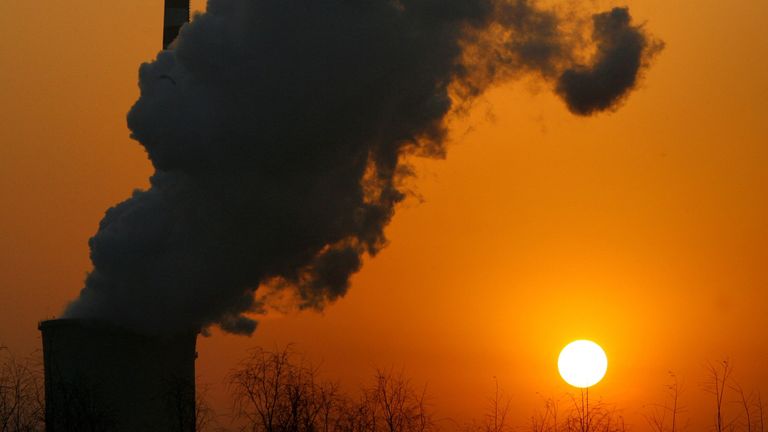Renewable power reaches record 30% of global electricity
Yet more growth in solar and wind last year, driven by countries like China and Brazil, marked a "milestone" in the world's switch to clean power, Ember said. There is now so much clean power that global fossil fuel power generation is about to fall, along with its emissions.
Wednesday 8 May 2024 01:00, UK
Experts have hailed a "critical turning point" as renewable power generated a record-breaking 30% of the world's electricity last year, new data has found.
It raises hopes that the peaking of global greenhouse gas emissions is on the horizon.
But there are concerns many countries are being held up in their switch to clean power because they cannot access the cash needed to fund it.
Last year's renewable power "milestone" was driven by yet another booming year for wind and especially solar.
China, Brazil and the Netherlands led the way in terms of fast roll-outs, thinktank Ember said in its annual Global Electricity Review.
China alone accounted for 51% of new solar generation and 60% of new wind, even as it continued to build vast amounts of new coal power too.
Christiana Figueres, former United Nations climate chief, called 2023 a "critical turning point".
She said "outdated" fossil fuels now can't compete with the "exponential innovations and declining cost curves in renewable energy and storage".
"All of humanity and the planet upon which we depend will be better off for it," she added.
In the last two decades, solar and wind have defied expectations and grown far faster than expected, surging from just 0.2% of global power generation in 2000 to 13.4% in 2023.
Dave Jones, Ember's head of global insights, said the huge growth was due to "matured" policies and technologies and a plummet in costs.
The cost of solar power halved last year despite a surge in demand, thanks to an explosion in manufacturing capacity.
Meanwhile problems that had held up wind power - such as inflationary costs - began to resolve, unlocking more projects.
A 'genuinely ambitious' renewables target
At the COP28 climate summit in Dubai last year leaders pledged to triple renewable power capacity by 2030.
The "genuinely ambitious" target shows leaders are backing renewables, which are the "main tools that we have in the box today to deliver the big emissions reductions we need", rather than riskier technology, such as that to remove carbon dioxide from the atmosphere, Mr Jones said.
Ember suggests the global burning of fossil fuels in the power sector probably peaked in 2023 and will start to fall this year, along with the pollution and emissions they bring.
As the power sector accounts for the largest share of global emissions, that means global emissions could start to fall soon too.
That is good news for curbing climate change, although scientists have repeatedly warned that emissions are not falling fast enough to limit global warming to agreed safer levels.
Mr Jones said the pace of emissions falls "depends on how fast the renewables revolution continues".
Joab Okanda, a senior adviser for Christian Aid, based in Kenya, said the roll-out would be "so much faster with the right investment" in African nations, which often face much higher borrowing costs than other countries.
Be the first to get Breaking News
Install the Sky News app for free


Hanan Morsy, deputy executive secretary and chief economist at the UN's Economic Commission for Africa, said the continent holds "big potential in renewable energy".
"Yet a dismally small share of less than 2% of global renewable energy investments are made on the continent. The continent can't develop further without access to energy."
He called for financial reforms to bring in affordable and new types of funding.
Financing the clean transition in developing nations, which have typically contributed the least to climate change, will be a key issue at this year's UN climate summit, COP29 in Azerbaijan.





